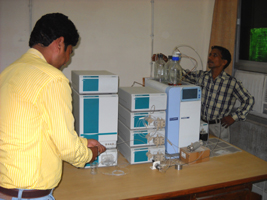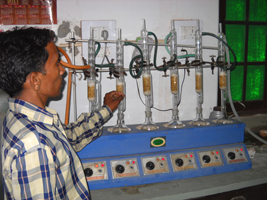

|
|
The
Department
of
Agronomy,
one
of
the
oldest
departments
of
the
Institute
of
Agricultural
Sciences,
was
established
as
a
section
in
the
year
1951
which
subsequently
became
a
full
fledged
department
in
1968.
During
its
sojourn
of
around
50
years
it
has
touched
many
a
milestone
of
achievements
and
in
the
process
has
carved
a
prominent
niche
in
the
academic
arena
of
the
nation.
Till
date
the
department
has
produced
more
than
550
M.Sc.
(Ag)
and
300
Ph.D.
degree
holders
who
were/are
holding
key
positions
in
Agricultural
Universities,
Colleges,
ICAR
Institutions,
NGOs,
Banks,
Public
Sector
Units
and
Administrative
services.
The
department
offers
courses
at
Graduate,
Master's
and
Ph.D.
levels
in
crop
production,
soil
fertility,
water
management
and
weed
management.
Several
coordinated,
collaborative
and
ad-hoc
research
projects
funded
by
ICAR,
RWC/CIMMYT,
IRRI,
World
Bank,
DST,
DBT,
UPCAR,
UGC,
TIFAC
were/are
operating
in
the
department.
Significant
research
achievements
have
been
made
in
natural
resource
management,
conservation
agriculture,
in-situ
rain
water
management,
farming
system
models,
boro
rice,
integrated
nutrient
management,
fly
ash
utilization,
dryland
agriculture,
multiplication
of
inbred
parental
lines
for
hybrid
seed
production,
crop
agronomy,
bio
herbicide
from
plant
products
etc.
The
technologies
developed
are
constantly
validated
through
on
farm
adaptive
research
for
its
promotion
and
diffusion
in
the
region.
In
addition
to
this
the
department
also
regularly
organizes
travelling
seminar,
kisan
gosthis,
farmers'
training,
field
days,
field
demonstration,
on
farm
trials
besides
maintaining
active
research
linkages
with
international
research
organizations.
Specifically
the
department
handles
2
permanent
All
India
Coordinated
Research
Projects
funded
by
ICAR
viz;
Dryland
and
Integrated
Farming
System
and
a
number
of
ad-hoc
projects.
For
the
first
time
in
the
history
of
the
Institute
in
the
year
2012
the
Department
was
awarded
Special
Assistance
Programme
(SAP,
DRS)
Phase
1
by
the
University
Grants
Commission
(UGC)
in
recognition
of
its
exemplary
contribution
to
the
subject
during
the
last
several
decades
with
the
mandate
to
work
on
"Water
Productivity".
Along
with
that
5
BSR
(Basic
Science
Research)
Fellowships
per
year
for
5
years
(2012-17)
have
also
been
granted
by
the
UGC
to
the
students
at
Doctoral
level
to
conduct
in
depth
basic
research
on
water
productivity.
Keeping
in
mind
these
developments
the
future
thrust
areas
have
been
identified
as
under,
\
- Reducing water footprint in agricultural
sector
- Developing agronomic strategy to
overcome
the
challenges
of
climate
change
- Fine tuning and refining Integrated
Farming
System
models
under
different
eco-systems
for
livelihood
security
of
the
farming
community.
|


